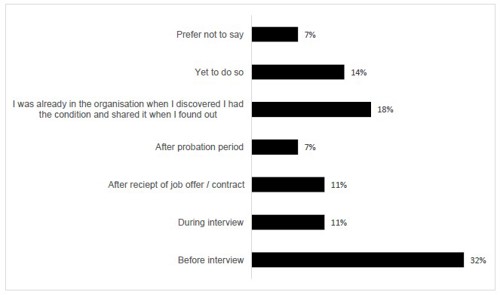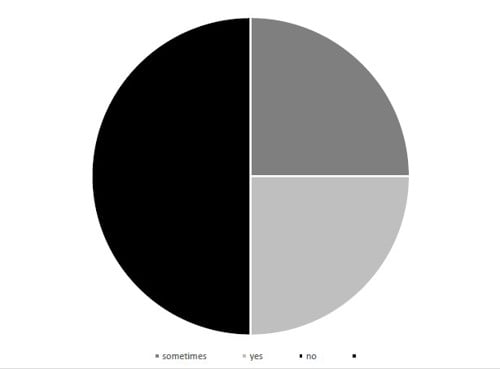When do you share?
When did you share your condition with your current employer?

If you are self-employed, do you share your condition with clients?
Sometimes 25%, Yes 25%, No 50%

Personal experiences: one big ask
Andy Shaw – Software Tester
The best things you can do for colleagues who are neurodiverse are to listen to them, learn about their specific condition and make reasonable adjustments to help them succeed in their role. Do not dismiss their needs or just assume they are under-performing, being lazy or daydreaming (which I was unfairly accused of in a previous role) and if adjustments need to be made, (e.g. more time to develop or test a piece of software, or to further clarify a specific requirement for a user story), please help them be more effective. Doing this also helps the business grow. Pairing neurodiverse professionals with more experienced colleagues, where possible, also helps share the knowledge about the systems to be tested, as well as the tools used, and gives them more confidence in the work they need to undertake for their role.
Please also do not hold them back if they are interested in learning a new skill, or area, particularly if they see it benefiting your business in some way as they may have identified an opportunity for an organisation to grow. Some may also learn outside of work in their own time, as I have done before.
If an employee with a neurodiverse condition is treated badly at a company, or they feel their needs are neglected or ignored, word of mouth is a very powerful tool and it can damage that company’s reputation and credibility, and will encourage potential employees to look elsewhere for an organisation that will nurture them.
Senior Engineer in cybersecurity
We need to get past these two conflicting (but pervasive) stereotypes of neurodiversity in the working world. We are not especially fragile by default and you don’t need to tread eggshells around us. Conversely, expecting us all to have a ‘superpower’ is unrealistic.
Head of User Experience and Business Analysis
Be more open to non-academic entrants, not only does this impact those with disabilities and neurodiverse conditions, it will have a positive effect on low-SEB recruitment.
Reginald Lee, Business Information Security Officer
Look beyond the disability. Ask what you can do to help and listen, not assume that something cannot be done.
Notes on the survey
The survey was conducted online by BCS, The Chartered Institute for IT. Overall 53 respondents completed this questionnaire between 4–28 July 2023. All respondents answered yes to a screening question identifying as neurodivergent, disabled or sensorily impaired.













